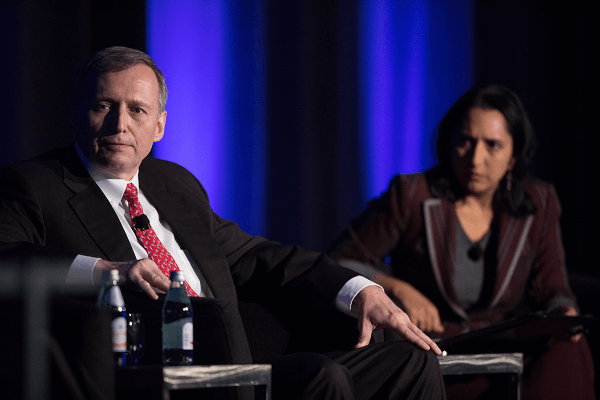At Callan’s recent National Conference, our guest speakers tackled the major issues and themes facing institutional investors in the coming years. We’ll cover the highlights of their comments in a series of posts. This is the fourth; the first appeared here, the second here, and the third here.
In a panel moderated by comedian and former venture capitalist Dhaya Lakshminarayanan, John Chisholm of Acadian Asset Management, Mary Jane McQuillen of ClearBridge Investments, and Prof. Robert Eccles of the University of Oxford discussed environmental, social, and governance (ESG) principles and how they apply to investment theory and design.
Lakshminarayanan began by asking the panelists to define ESG and describe its place in the institutional investing industry. Starting off, Chisholm offered a concise description of it as “the application of non-financial information for the making of investment decisions”—and, he said, that is usually material nonfinancial information. And McQuillen defined it as an opportunity for investors to firm up their investment due diligence because it helps them to better understand companies. As to its role in the industry, Eccles pointed out one area of tension: Companies are taking ESG into account in their core strategies, but those companies feel investors are not acknowledging that focus.
Lakshminarayanan then turned to a recent letter from BlackRock Chairman Larry Fink asking CEOs to do more to contribute to society, asking the panelists whether the letter was a “tipping point.” Eccles described it as a “pretty bold step,” and emphasized that Fink’s stance makes sense for big investors like BlackRock because they cannot diversify away from systemic risk. Chisholm said he did not think it was a tipping point, but he did say it was a significant step in the move to use ESG more widely in investing.

Fink’s letter also illustrates a shift within the industry, McQuillen said. Efforts to invest in a more socially responsible way started with smaller shops, but they did not receive much attention. Now larger investors are agreeing.
One concern investors raise about ESG is its impact on returns, Lakshminarayanan noted. McQuillen said that was the right focus, and noted that studies show portfolios using ESG principles, overall, can in many cases outperform traditional portfolios and reduce risk. She also said that taking into account ESG factors is actually vital for companies, noting, for instance, that beverage companies rely on access to clean water.
Chisholm’s firm takes a dual-track approach to ESG principles, he said. It uses ESG signals that indicate better performance in the investing process for all clients, but neutral ESG signals (i.e., beneficial from an ESG standpoint but don’t affect performance) are used only for clients interested in ESG.

Next, Lakshminarayanan asked the panelists why, if ESG could be so beneficial, hedge funds were not investing using the principles. Eccles said that may be changing; three activist hedge funds are considering starting an impact investing fund incorporating an ESG approach. If they are mobilizing to address ESG issues, he said, then that’s a “potentially fascinating trend.”
Chisholm also pointed out that five years ago data availability was an issue; but that is less so now, and the increased availability of data impacts the willingness of hedge funds to look at ESG.
Lakshminarayanan questioned whether the data is robust enough. McQuillen said that managers need to drill down into the data to make sure it is credible. The best way to do that, she said, is to have analysts reaffirm that the data has value for sustainable strategies.
In a provocative part of the discussion, Lakshminarayanan asked the panelists whether it is the job of investors to make the world a better place. Eccles responded that yes, it is; otherwise institutional investors will not get the returns they need. McQuillen echoed his response, citing as one example the fact that Costco pays a living wage to its employees, far above the typical retailer—and that it has been a good stock to own. And Chisholm said his job is to help clients meet return objectives, and looking at ESG can help them do that.
For the future of ESG, Chisholm described its adoption as a continued evolution. More sponsors are incorporating ESG principles, but U.S. plan sponsors continue to be focused on how they can justify ESG. And Eccles noted one fascinating development: Even Middle East sovereign wealth funds, built on oil profits, are looking at ESG—this, he said, signals that there will be more momentum in this space.


